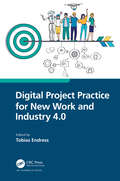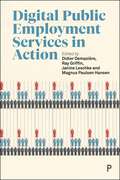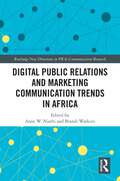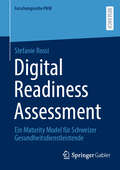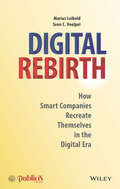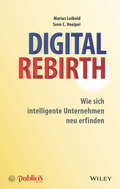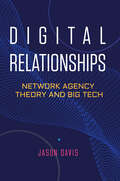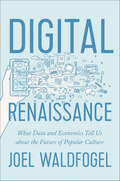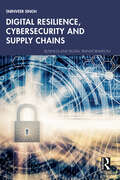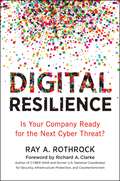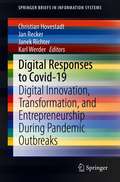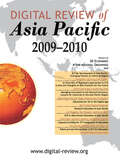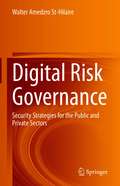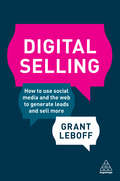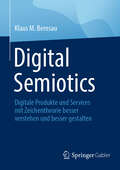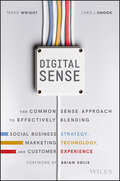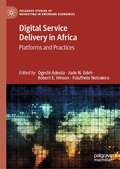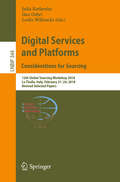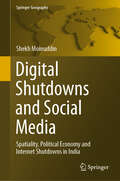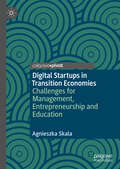- Table View
- List View
Digital Project Practice for New Work and Industry 4.0
by Tobias EndressNew Work and Industry 4.0 have matured and this book takes a practical, experience-based approach to project management in these areas. It introduces methods and covers the practical aspects. It critically examines existing approaches and practices and shows their limitations. The book covers appropriate methods as well as human and social aspects. It contributes to the ongoing discussion of business practices and methods. It also aims to stimulate dialogue in the professional community. Digital Project Practice for New Work and Industry 4.0 begins by introducing basic concepts in the context of Industry 4.0 and discussing how they might influence organizational communication and impact the work environment. After examining the possibilities and challenges of remote work and collaboration in distributed teams all over the world, the book looks at a company's fundamental changes related to New Work from a practical business perspective as well as legal and ethical perspectives. It reviews the case of the VW emission scandal and recommends ways to improve corporate culture. Legal issues include New Work and hybrid forms of collaboration as well as liability for automated decisions (i.e., the potential need for an ‘electronic person’). Other implications for the workplace include how: Industry 4.0 might influence the potential demand for "Digital Unions" Industry 4.0, and lean production, and their applications can change industrial practices Open Banking presents new approaches and new business models Work structures and systems can empower employees’ work self-management This book also looks at how New Work effects individual workers. It addresses digital stress, introduces strategies for coping with it, and discusses related topics. It also explores the benefits of meditation and the economics of mind, body, and spirit. In essence, this book cover appropriate methods along with human and social factors. It also covers practice, different perspectives, and various experiences from all around the globe. Contributing to the ongoing discussion on business practices and methods, this book will nourish and stimulate dialogue in the professional community.
Digital Public Employment Services in Action
by Didier Demazière, Ray Griffin, Janine Leschke and Magnus Paulsen HansenThis book offers a comprehensive exploration of the ongoing digital transformation of public employment services (PES) – the most radical remaking of the welfare state in a generation. As PES shift from analogue to fully digitised services, this volume bridges the gap between technology, policy and frontline service provision. It provides a well-rounded analysis of the practical opportunities and challenges posed by digital welfare, reconnecting and reconciling technical possibilities and political ambitions with what is socially necessary as welfare systems undergo radical change.
Digital Public Relations and Marketing Communication Trends in Africa (Routledge New Directions in PR & Communication Research)
by Brandi Watkins Anne W. NjathiThe uptake of digital media platforms necessitates the need to understand how digital cultures of consumers and brands are unfolding. Despite the increase in usage and adoption of the internet in Africa, there is limited information about digital marketing trends on the continent. This book is among the first to present an edited collection of chapters on digital and influencer marketing authored by many who are either from or have close ties to Africa.This book showcases digital marketing trends in Africa that are burgeoning at the same speed as the uptake of technology in the continent. With this in mind, the contributors seek to interrogate digital marketing trends in two stages: the status of digital marketing on the African continent, including cases from Nigeria, Egypt, Uganda and Kenya, and an analysis of the rise of influencer marketing, including cases from Nigeria and Uganda. This book will explore factors driving the increase in digital media platforms in Africa as well as an analysis of the implications of the growth in digital marketing, using various theoretical and methodological underpinnings to probe trends.Digital Public Relations and Marketing Communication Trends in Africa provides significant implications for marketing scholars and researchers and will be relevant to those looking to understand the opportunities and challenges ahead.
Digital Quality Management in Construction
by Paul MarsdenMuch has been written about Building Information Modelling (BIM) driving collaboration and innovation, but how will future quality managers and engineers develop digital capabilities in augmented and video realities, with business intelligence platforms, robots, new materials, artificial intelligence, blockchains, drones, laser scanning, data trusts, 3D printing and many other types of technological advances in construction? These emerging technologies are potential game changers that require new skills and processes. Digital Quality Management in Construction is the first ‘how to’ book on harnessing novel disruptive technology in construction quality management. The book takes a tour of the new technologies and relates them to the management of quality, but also sets out a road map to build on proven lean construction techniques and embed technologically based processes to raise quality professionals’ digital capabilities. With the mountain of data being generated, quality managers need to unlock its value to drive the quality of construction in the twenty-first century, and this book will help them do that and allow those working in construction Quality Management to survive and thrive, creating higher quality levels and less waste. This book is essential reading for quality managers, project managers and all professionals in the Architecture, Engineering and Construction industry (AEC). Students interested in new and disruptive technologies will also learn a great deal from reading this book, written by a professional quality manager with nearly thirty years’ experience in both the public and private sectors.
Digital Readiness Assessment: Ein Maturity Model für Schweizer Gesundheitsdienstleistende (Forschungsreihe PHW)
by Stefanie RossiDie Digitalisierung verändert das Gesundheitswesen rasant und schafft neue Chancen. Doch gerade für kleine und mittelgroße Gesundheitsdienstleistende ist es oft schwierig, den eigenen digitalen Reifegrad zu erfassen und zielgerichtet weiterzuentwickeln. Hier setzt das Digital Readiness Assessment an – ein speziell entwickeltes Modell, das Gesundheitsdienstleistende dabei unterstützt, ihre digitale Reife systematisch zu bewerten, Fortschritte sichtbar zu machen und die Digitalisierung gezielt voranzutreiben. Ziel ist eine auf Patientinnen und Patienten ausgerichtete, zukunftssichere Gesundheitsversorgung, die Effizienz und Qualität optimal vereint. Das Digital Readiness Assessment hilft dabei, den digitalen Wandel aktiv zu gestalten, Potenziale zu erkennen und Gesundheitsdienstleistende erfolgreich für die Zukunft aufzustellen.
Digital Rebellion: The Birth of the Cyber Left
by Todd WolfsonDigital Rebellion examines the impact of new media and communication technologies on the spatial, strategic, and organizational fabric of social movements. Todd Wolfson begins with the rise of the Zapatistas in the mid-1990s, and how aspects of the movement--network organizational structure, participatory democratic governance, and the use of communication tools as a binding agent--became essential parts of Indymedia and all Cyber Left organizations. From there he uses oral interviews and other rich ethnographic data to chart the media-based think tanks and experiments that continued the Cyber Left's evolution through the Independent Media Center's birth around the 1999 WTO protests in Seattle. After examining the historical antecedents and rise of the global Indymedia network, Wolfson melds virtual and traditional ethnographic practice to explore the Cyber Left's cultural logic, mapping the social, spatial and communicative structure of the Indymedia network and detailing its operations on the local, national and global level. He also looks at the participatory democracy that governs global social movements and the ways the movement's twin ideologies, democracy and decentralization, have come into tension, and how what he calls the switchboard of struggle conducts stories of shared struggle from the hyper-local and dispersed worldwide. As Wolfson shows, understanding the intersection of Indymedia and the Global Social Justice Movement illuminates their foundational role in the Occupy struggle, Arab Spring uprising, and the other emergent movements that have in recent years re-energized radical politics.
Digital Rebirth: How Smart Companies Recreate Themselves in the Digital Era
by Marius Leibold Sven C. VoelpelDigital Rebirth transcends digital transformation. It involves a revolutionary reinventing of the purpose, nature and processes of a company, with accompanying digital business and technological platforms. This book presents a clear framework for practical digital rebirth of companies, contrasting it to prevalent "digital transformation" approaches. Aimed at large and medium-sized companies, as well as their subcontractors and service providers, but also at budding entrepreneurs, it should be read and used by company boards, executives, managers, startup leaders and business consultants.. - In every section of the book you will find proven concepts of Digital Rebirth, digital reinvention, collaborative digital practices, combinatorial technologies, digital platforms, digital ecosystems and pointers how to move from obsolete mindsets and left-over baggage to reinvented digitalization minds and processes. - It shows clearly how some major companies have digitally rebirthed themselves - or are in the process of it - to be or to become a leading player in the digital economy. - Company (and industry) illustrations are accompanied by descriptions of Digital Rebirth approaches, methodologies and practical tools. - The book's content is ideal for use in company workshops and executive sessions, as well as business leadership mindset sessions, and has been validated in such activities by the authors, including boards of highly renowned companies on all continents. - At the end of the book, the unique approach of Digital Rebirth is condensed into a framework of five digital drivers, to assist in the right activities for purposeful and successful company rebirth. The concept of Digital Rebirth shows clearly that, in the light of recent developments like Internet of Things, Artificial Intelligence, Industry 4.0 and Cloud-based Services, well-established traditional industry and competitive models are not any longer satisfactory to understanding and dealing with digital realities.
Digital Rebirth: Wie sich intelligente Unternehmen neu erfinden
by Marius Leibold Sven C. VoelpelDie digitale Transformation wird in vielen Fällen nicht ausreichen, um die Herausforderungen der Zukunft zu bewältigen. Digital Rebirth ist mehr, es bedeutet eine Neukonzeption der Ziele, Leistungen, Kultur und Prozesse eines Unternehmens, inklusive der technologischen Plattform. Dieses Buch präsentiert praktische Rahmenbedingungen für den Digital Rebirth. Es richtet sich an etablierte große und mittlere Unternehmen, an deren Zulieferer und Dienstleister ebenso wie an jüngere Unternehmen und Startups. Und damit an Vorstände und Eigentümer, Führungskräfte, Unternehmensgründer und Consultants. - In jedem Kapitel beschreibt es bewährte Konzepte des Digital Rebirth, von der digitalen Neuausrichtung über digitale Plattformen und Ökosysteme bis zu Hinweisen, wie man von überkommenen Auffassungen zu neuartigen Denkweisen kommt und sich von unternehmerischem Ballast und alten Prozessen befreit. - Es zeigt deutlich, wie bekannte Unternehmen den Rebirth bereits gemeistert haben - oder gerade dabei sind, sich zu einem der Spielmacher der digitalen Wirtschaft zu entwickeln. - Darstellungen für Unternehmen und Branchen werden unterstützt durch Beschreibungen der Ansätze, Methoden und praktische Tools. - Der Inhalt des Buchs dient als Grundlage für Workshops, Management-Meetings sowie Führungskräfte-Brainstormings, wie sie von den Autoren bereits erfolgreich durchgeführt wurden. - Am Ende des Buchs wird der Ansatz des Digital Rebirth zu einem Set von fünf digitalen Treibern zusammengefasst, als Tools für eine zielgerichtete und erfolgreiche Unternehmensneuausrichtung. Das Konzept des Digital Rebirth zeigt deutlich, dass etablierte Business- und Wettbewerbsmodelle unter dem Aspekt des Internet der Dinge, künstlicher Intelligenz, Industrie 4.0 und cloudbasierten Diensten nicht mehr ausreichen, die digitale Welt abzubilden und zu verstehen. Inhalt Digital Rebirth. Weil Digitale Transformation und Roadmaps nicht ausreichend sind Was Digitalisierung wirklich bedeutet. Trends, Konsequenzen, Mythen Was Digitalisierung von uns verlangt. Neue Denkweisen, richtige Fragestellungen Das Kernkonzept des Digital Rebirth. Der Aufbau digitaler Unternehmensplattformen Horizontaler Digital Rebirth. Unternehmens-Ökosysteme gestalten und pflegen Vertikaler Digital Rebirth. Die Nutzung cloudbasierter Dienste Prozesse, Menschen, Qualifikationen. Die Fähigkeiten zum Digital Rebirth entwickeln Digital Leadership. Die Neuausrichtung von Unternehmen Das Werkzeug. Fünf Treiber für erfolgreichen Digital Rebirth Fazit. Digital Rebirth als entscheidender Impulsgeber für Unternehmen "Eine zeitgemäße Orientierungshilfe für Manager und Berater in praktisch jeder Branche." ? Prof. Dr. Thomas Bauer
Digital Relationships: Network Agency Theory and Big Tech
by Jason DavisWhy do so many organizations fail to mobilize the social networks of employees to respond to disruptions, innovate, and change? In Digital Relationships, Jason Davis argues that individual and organizational interests about networking can come out of alignment such that the network ties that individuals form are organizationally sub-optimal for achieving their most ambitious goals. Developing a new perspective about networks and organizations, he explains through network agency theory how network problems emerge, the role of digital technology adoption by organizations in amplifying misalignment, and the capacity of managers and function of the executive to resolve agency problems and mitigate their impact. Drawing on over a decade of qualitative research in US, Asian, and European "big tech" companies and new analytical and computational modeling, this book offers new interpretations and solutions to the pathologies that emerge from organizationally detrimental networking behaviors and in the face of managerial interventions.
Digital Renaissance: What Data and Economics Tell Us about the Future of Popular Culture
by Joel WaldfogelHow digital technology is upending the traditional creative industries—and why that might be a good thingThe digital revolution poses a mortal threat to the major creative industries—music, publishing, television, and the movies. The ease with which digital files can be copied and distributed has unleashed a wave of piracy with disastrous effects on revenue. Cheap, easy self-publishing is eroding the position of these gatekeepers and guardians of culture. Does this revolution herald the collapse of culture, as some commentators claim? Far from it. In Digital Renaissance, Joel Waldfogel argues that digital technology is enabling a new golden age of popular culture, a veritable digital renaissance.By reducing the costs of production, distribution, and promotion, digital technology is democratizing access to the cultural marketplace. More books, songs, television shows, and movies are being produced than ever before. Nor does this mean a tidal wave of derivative, poorly produced kitsch; analyzing decades of production and sales data, as well as bestseller and best-of lists, Waldfogel finds that the new digital model is just as successful at producing high-quality, successful work as the old industry model, and in many cases more so. The vaunted gatekeeper role of the creative industries proves to have been largely mythical. The high costs of production have stifled creativity in industries that require ever-bigger blockbusters to cover the losses on ever-more-expensive failures.Are we drowning in a tide of cultural silt, or living in a golden age for culture? The answers in Digital Renaissance may surprise you.
Digital Resilience, Cybersecurity and Supply Chains (Business and Digital Transformation)
by Tarnveer SinghIn the digital era, the pace of technological advancement is unprecedented, and the interconnectivity of systems and processes has reached unprecedented levels. While this interconnectivity has brought about numerous benefits, it has also introduced new risks and vulnerabilities that can potentially disrupt operations, compromise data integrity, and threaten business continuity. In today's rapidly evolving digital landscape, organisations must prioritise resilience to thrive. Digital resilience encompasses the ability to adapt, recover, and maintain operations in the face of cyber threats, operational disruptions, and supply chain challenges. As we navigate the complexities of the digital age, cultivating resilience is paramount to safeguarding our digital assets, ensuring business continuity, and fostering long-term success. Digital Resilience, Cybersecurity and Supply Chains considers the intricacies of digital resilience, its various facets, including cyber resilience, operational resilience, and supply chain resilience. Executives and business students need to understand the key challenges organisations face in building resilience and provide actionable strategies, tools, and technologies to enhance our digital resilience capabilities. This book examines real-world case studies of organisations that have successfully navigated the complexities of the digital age, providing inspiration for readers’ own resilience journeys.
Digital Resilience: Is Your Company Ready for the Next Cyber Threat?
by Ray RothrockIn the Digital Age of the twenty-first century, the question is not if you will be targeted, but when. Are you prepared? If not, where does one begin? For an enterprise to be fully prepared for the immanent attack, it must be actively monitoring networks, taking proactive steps to understand and contain attacks, enabling continued operation during an incident, and have a full recovery plan already in place.Cybersecurity expert Ray Rothrock has provided for businesses large and small a must-have resource that highlights:the tactics used by today&’s hackers,vulnerabilities lurking in networks,and strategies not just for surviving attacks, but thriving while under assault.Businesses and individuals will understand better the threats they face, be able to identify and address weaknesses, and respond to exploits swiftly and effectively. From data theft to downed servers, from malware to human error, cyber events can be triggered anytime from anywhere around the globe.Digital Resilience provides the resilience-building strategies your business needs to prevail--no matter what strikes.
Digital Responses to Covid-19: Digital Innovation, Transformation, and Entrepreneurship During Pandemic Outbreaks (SpringerBriefs in Information Systems)
by Jan Recker Karl Werder Christian Hovestadt Janek RichterThis book presents ten essays that examine the potential of digital responses to the COVID-19 pandemic. The essays explore new digital concepts for learning and teaching, provide an overview of organizational responses to the crisis through digital technologies, and examine digital solutions developed to manage the crisis. Scientists from many disciplines work together in the fight against the virus and its numerous consequences. This book explores how information systems researchers can contribute to these global efforts. The book will be of interest to researchers and scholars in the field of digital business and education.
Digital Review of Asia Pacific 2009-2010
by Shahid Akhtar and Patricia ArintoThe biennial Digital Review of Asia Pacific is a comprehensive guide to the state-of-practice and trends in information and communication technologies for development (ICTD) in the Asia Pacific region. This fourth edition (2009-2010) features 30 economies and four sub-regional groupings. The chapters provide updated information on ICT infrastructure, industries, content and services, key programs, enabling policies and regulation, education and capacity building, open source, and research and development initiatives, as well as ICTD challenges in each of the economies covered. The common framework that underpins these reports allows readers to undertake a comparative analysis and assess progress across Asia Pacific. In addition, regional overviews provide a synthesis of ICTD trends, regulatory issues, and lessons for managing innovation in the network economy. The thematic chapters focus on issues in ICT in education, a key area in ICTD. The authors are drawn from government, academe, industry and civil society, providing a broad perspective on the use of ICTs for human development.
Digital Rights at the Periphery: Making Brazil's Marco Civil (Geopolitics of Information)
by Guy T. HoskinsSigned into law in 2014, the Marco Civil da Internet (Brazilian Civil Rights Framework for the Internet) appeared to offer pioneering legislation for a digital bill of rights that addressed issues like network neutrality and privacy. Guy T. Hoskins chronicles the Marco Civil’s development and its failure to confront the greatest concentration of power in the digital age: informational capitalism. Combining interviews with discourse and political-economic analysis, Hoskins reveals why the legislation fell short while examining the implications of its emergence in Brazil, which remains on the margins of the global system of informational capitalism. Hoskins places collectivist and public service principles at the core of any framework’s effectiveness. He also shows why we must create systems sensitive to the sociocultural and political-economic contexts that will shape digital rights and their usefulness. Compelling and contrarian, Digital Rights at the Periphery looks at communications policy and internet governance in the Global South and the lessons they provide for the rest of the world.
Digital Risk Governance: Security Strategies for the Public and Private Sectors
by Walter Amedzro St-HilaireThis book discusses digital risk governance in a global context and provides practical solutions for sound digital policy. From cyber-attacks to the mechanisms of digital technical management on a global scale, this book identifies the fundamental areas of digital vulnerability for both states and businesses and outlines the means of securing them. Written with the digital security needs of the public and private sectors in mind, chapters provide approachable guidance on navigating national digital strategies for public and corporate cyber-risks, identifying mechanisms for embedding digital security over time, protecting both personal and strategic economic data, adapting regulations to digital challenges, and leveraging innovation and multilateralism for digital security. Providing a comprehensive view of digital risk mechanisms for multiple stakeholders, this volume will be useful for professionals and practitioners in technology governance, digital management, IS/risk management, digital security, and internet policy.
Digital Selling: How to Use Social Media and the Web to Generate Leads and Sell More
by Grant LeboffThe sales and marketing functions are increasingly converging, with lead generation now frequently arising from digital promotional campaigns, and the opportunities for tried and tested consultative sales techniques diminishing in the face of scarce customer attention and availability, as well as a plethora of readily accessible comparative product information. To take part in this process, salespeople need to understand and interact with customers via multiple channels, participating in social media in collaboration with marketing to influence purchasing decisions and convert contacts to sales. Digital Selling makes sense of the new paradigms in which a salesperson now operates. It outlines the new strategies required to make the most of the plentiful opportunities that exist, and provides the practical advice salespeople need to use the social web effectively, generate leads and sell more.Packed with great advice for business people on engaging with their customers online and via social media, Digital Selling explains why embracing the social web is vital, how the sales role changes in a digital environment, the lead generation model in a digital world, how to build your online network and more. As such, sales professionals, digital sales directors, senior directors, SME owners and anyone required to make strategic decisions, implement programmes, and go out and sell seeking new ideas and ways to reach their markets will benefit from this straightforward and practical book from one of today's thought leaders on digital sales and marketing.
Digital Semiotics: Digitale Produkte und Services mit Zeichentheorie besser verstehen und besser gestalten
by Klaus M. BernsauDieses Buch erklärt, wie Unternehmen mit Hilfe der Semiotik – der Lehre von den Zeichen – ihre digitalen Produkte und Dienstleistungen erfolgreicher machen können. Denn die Wellness-App, der Warenkorb im Onlineshop oder der Like-Button in der Produktansicht haben eines gemeinsam: Sie basieren auf digitalen Zeichen. Diese kundengerecht einzusetzen, wird immer mehr zum Schlüssel für das Produkterlebnis und damit zur Voraussetzung für den Produkterfolg. Die moderne Semiotik verbindet Sprachwissenschaft, Erkenntnistheorie, Anthropologie, Psychologie und Sozialwissenschaften zu einem faszinierenden Blick auf digitale Angebote. Der Autor zeigt, wie Unternehmen diese Erkenntnisse nutzen können und liefert ein praxisnahes Buch für Produktmanager*innen, Marketer*innen, Kommunikator*innen, Designer*innen, Softwareentwickler*innen – kurz: für alle, die für digitale Produkte und Dienstleistungen verantwortlich sind.
Digital Sense: The Common Sense Approach to Effectively Blending Social Business Strategy, Marketing Technology, and Customer Experience
by Brian Solis Chris J. Snook Travis WrightCompete in the digital world with pragmatic strategies for success Digital Sense provides a complete playbook for organizations seeking a more engaged customer experience strategy. By reorganizing sales and marketing to compete in today's digital-first, omni-channel environment, you gain newfound talent and knowledge from the resources already at hand. This book provides two pragmatic frameworks for implementing and customizing a new marketing operating system at any size organization, with step-by-step roadmaps for optimizing your customer experience to gain a competitive advantage. The Experience Marketing Framework and the Social Business Strategy Framework break down proven methods for exceeding the expectations customers form throughout the entirety of the buying journey. Customizable for any industry, sector, or scale, these frameworks can help your organization leap to the front of the line. The evolution of marketing and sales demands a revolution in business strategy, but realizing the irrelevance of traditional methods doesn't necessarily mean knowing what comes next. This book shows you how to compete in today's market, with real-world frameworks for implementation. Optimize competitive advantage and customer experience Map strategy back to business objectives Engage customers with a pragmatic, proven marketing system Reorganize sales and marketing to fill talent and knowledge gaps Today's customer is savvy, with more options than ever before. It's critical to meet them where they are, and engagement is the cornerstone of any cohesive, effective strategy. The technological revolution has opened many doors for marketing and sales, but the key is knowing what lies behind each one—what works for your competitor may not be right for you. Digital Sense cuts through the crosstalk and confusion to give you a solid strategy for success.
Digital Service Delivery in Africa: Platforms and Practices (Palgrave Studies of Marketing in Emerging Economies)
by Ogechi Adeola Robert E. Hinson Jude N. Edeh Fulufhelo NetsweraThe dynamics of the world’s pervasive digital technologies is transforming organisations and enabling enterprises to create sustainable competitive advantage. This presents huge economic opportunities for Africa. This book responds to the need for African enterprises and organisations—particularly those in the service sector—to fully exploit the inherent potential in digital platforms by putting in place processes to respond effectively to changing consumer demands. Digital service delivery is conceptualised as a key driver of effective management and service delivery across the value chain of businesses. The authors offer insights into the opportunities, drivers, structures, and models of digital service delivery specific to the African context, using case studies and country-based themes that highlight how the adoption of digital platforms and practices can transform service delivery for value-creation. The book examines the scope and applications of digital businesses, emphasising the emergence, value-creation, and strategic implications for Africa’s private and public enterprises. Students, entrepreneurs, IT innovators, academics, and policymakers will gain a greater understanding of how digitalisation is shaping consumer expectations, industry practices, and service delivery in Africa.
Digital Services and Platforms. Considerations for Sourcing: 12th Global Sourcing Workshop 2018, La Thuile, Italy, February 21–24, 2018, Revised Selected Papers (Lecture Notes in Business Information Processing #344)
by Julia Kotlarsky Ilan Oshri Leslie WillcocksThis book constitutes revised selected papers from the 12th international Global Sourcing Workshop 2018, held in La Thuile, Italy, in February 2018. The 9 contributions included were carefully reviewed and selected from 40 submissions. The book offers a review of the key topics in sourcing of services, populated with practical frameworks that serve as a tool kit to students and managers. The range of topics covered in this book is wide and diverse, offering micro and macro perspectives on successful sourcing of services. Case studies from various organizations, industries and countries are used extensively throughout the book, giving it a unique position within the current literature offering.
Digital Shutdowns and Social Media: Spatiality, Political Economy and Internet Shutdowns in India (Springer Geography)
by Shekh MoinuddinThis book offers a spatial insights on the social mediasphere in the context of digital shutdowns and reflects the dimensions of political economy and of social media in general. Internet shutdowns have been found to be more prevalent in developing countries than in developed countries, with India leading in Internet shutdowns in the world. Internet shutdowns have occurred in India for several reasons, mainly to hinder the spreading of information through social media – this is discussed in detail along with political motives behind this and how this can conflict with government policies, such as the flagship program “Digital India” which is ostensibly meant to improve the infrastructure and expansion of digital information throughout the country. This book suggests new dimensions in the digital spatiality. Furthermore, the digital space is defined and discussed, including its role and how this might be reflected in concepts around spatiality and spaces. More concretely, the book considers the following questions: How is social media reflected in spatial sciences? How does the space differ from more tangible spaces, such as the hydrosphere or atmosphere? How do (computer/mobile phone) screens behave as a space/place in the context of behavioural sciences? How is this reflected in what is shaping and reshaping the spatiality of digital gadgets? Do digital gadgets change the socialization process that’s often considered a path towards how we develop in society? How do internet shutdowns affect the political economy and what patterns can be seen in how individuals, companies and the internet industry in particular react to these shutdowns in India?
Digital Solutions: Reframing Leadership
by Olivier SerratThis book acts as a valuable quick-access resource on the challenges and opportunities that the digital age presents to organizational leadership. Balanced, comprehensive, and thought-provoking, the book will be useful to professionals and practitioners. The book broadly follows a macro, meso, and micro approach to argumentation and is best read from beginning to end. The book synopsizes the historical context of technological revolutions and reflects on first-order results from enhanced use of information and communication technology in organizations; considers second-level impacts from information and communication technology on economy, society, work, and the very act of organizing; maps out core concepts of agility and principles that leaders should honor to exploit agility in newfound workforce ecosystems; showcases emerging leadership behaviors and mindsets; and specifies the good practice needed to plan and lead digital strategies. The book invites reference to the author's popular Knowledge Solutions: Tools, Methods, and Approaches to Drive Organizational Performance (2017) and the more recent Leading Solutions: Essays in Business Psychology (2021), which it both rests on and extends.
Digital Sport Marketing: Concepts, Cases and Conversations
by Paul Blakey Alan SeymourDigital sport marketing is a new, dynamic and rapidly evolving area that is having a profound impact on contemporary sport business. This is the only textbook to introduce core principles and best practice in digital sports marketing, focusing on key issues, emerging topics and practical techniques. The book surveys the new international digital landscape in sport business and explains how to apply digital marketing across key areas from fan engagement and public relations to strategic communication and branding. Every chapter includes discussion of key concepts, an in-depth case study, and an in-depth conversation with a leading industry practitioner that demonstrates how digital marketing works in the real world. Full of useful features, this is an essential textbook for any sport marketing, sport management, sport business or sport development course.
Digital Startups in Transition Economies: Challenges for Management, Entrepreneurship and Education
by Agnieszka SkalaThis book responds to the growing demand for a scientific approach to the concept of startups, which are a manifestation of the digital revolution and an innovation-driven economy. With a focus on digital enterprises, the author presents empirical research carried out over 4 years in collaboration with the Startup Poland Foundation, and provides a developed universal definition of a startup. This book highlights the necessity of a clear definition, in order for startups to be treated as a permanent economic phenomenon, rather than a temporary whim. Addressing the crucial need for an effective startup management methodology and more education on this form of entrepreneurship, Digital Startups in Transition Economies offers guidance for those researching entrepreneurship and innovation, as well as entrepreneurs, public institutions, startup accelerators and technology transfer centres.
